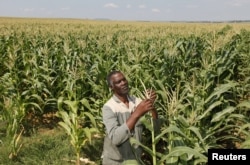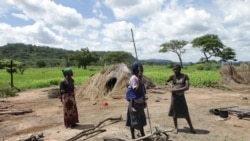Zimbabweans took up arms to fight against colonialism with the land question as a driving force for achieving black majority rule in the southern African nation.
Following a protracted liberation struggle, independence was achieved on April 18th, 1980. Almost 36 years after independence, the land question still remains unresolved with some Zimbabweans saying they were left out of the controversial agrarian reforms, which left over 3,500 white commercial farmers landless. On the other hand, some Zanu PF activists are happy that they are owners of prime land in Zimbabwe.
Some of the people, who were left out of the land reform program that kicked off in 2000 when the ruling Zanu PF party felt the political heat from the then newly formed Movement for Democratic Change, say it is saddening that only the ruling elite and people connected to President Robert Mugabe’s party were given pieces of land.
One of them is Obious Musaingwa, a Mutare resident, who says he has over the years been sidelined from such programs due to political reasons.
Musaigwa says, “To be very honest we have not benefitted from the land reform and the so-called economic empowerment program. Some of us who seem to be non-aligned have not benefitted anything from the political blueprints.”
Llyod Gumbo, a Zanu PF youth based in the eastern border city in Manicaland province, agrees, claiming that this has been going on for almost 36 years.
Gumbo says, “Actually that issue about economic empowerment and land reform has not benefitted youths like myself, but what we have realized now is that it has benefitted only the politically-connected and senior Zanu PF officials leaving out the key people that should have benefitted.”
Another Mutare resident, James Mupfumi who is a researcher with the Centre for Research and Development, says the economic empowerment and land reform programs were noble schemes initiated by President Mugabe’s government though they have remained a pipedream for many Zimbabweans.
“Like any ordinary Zimbabwean, I have not derived any benefit from such initiatives as it is common knowledge that these programs have only gotten into the hands of purely Zanu PF supporters and the inner circle of the ruling party,” says Mupfumi.
However, Zanu PF activist and medical practitioner, Bernadette Ndungwani, says the ruling party brought a lot of opportunities to the marginalized black majority in the country.
Ndungwani argues that “as an individual, I benefitted a lot from the ruling party as I managed to get an education from their programs to empower blacks as I was able to attend a multiracial school and enroll further at a medical school as a state registered nurse which was unforeseeable for us then. It is with pleasure that I am currently where I am and who I am because of that.”
Charles Samuriwo, former spokesman of the Zanu PF Youth League in Manicaland, concurs, adding that he is also a beneficiary of the land reform and black empowerment programs.
However, he says more still needs to be done to include millions of Zimbabweans.
“I am a proud beneficiary of the land reform program and a proud beneficiary of the economic empowerment done by the ruling party. I also celebrate these programs that were done to benefit every Zimbabwean … to bring about equity to the majority of us. It is an achievement that we need to take as an achievement by the government of Zimbabwe and not as a Zanu PF achievement.”
Tanaka Mukuvaza, a Zanu PF youth, echoes the same sentiments while he appreciates the empowerment programs spearheaded by his party, he is worried about the high levels of corruption within the former liberation movement.
“As a citizen and a youth we benefitted at the last minute and it was through unscrupulous means as we are still facing challenges from Zanu PF and government officials who want kick-backs for the efforts they say they did to get the land.”
Manicaland Provincial Affairs Minister, Mandi Chimene, says she is also a proud beneficiary of all government programs as she now owns a farm despite her little education and is grateful to President Mugabe.
Thousands of blacks affiliated to the ruling elite are believed to be owners of pieces of land with some of them having multiple farms. A land audit appears to be resented by those in power fearing that they may be exposed if an independent assessment of land ownership is conducted in Zimbabwe.













